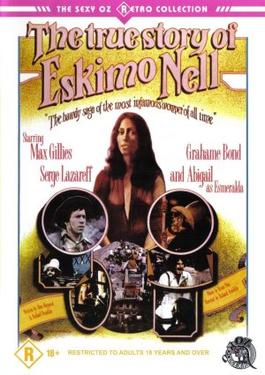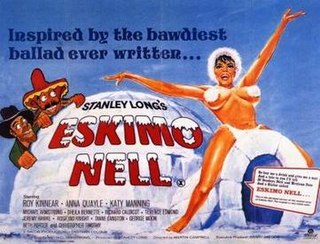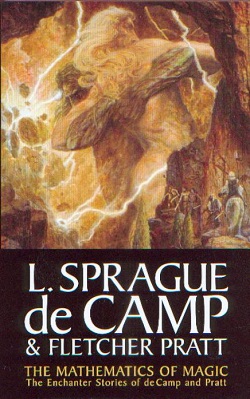Related Research Articles
Cunt is a vulgar word for the vulva or vagina. It is used in a variety of ways, including as a term of disparagement. "Cunt" is often used as a disparaging and obscene term for a woman in the United States, an unpleasant or stupid man or woman in the United Kingdom, or a contemptible man in Australia and New Zealand. In Australia and New Zealand, it can also be a neutral or positive term when used with a positive qualifier. The term has various derivative senses, including adjective and verb uses.

A double entendre is a figure of speech or a particular way of wording that is devised to have a double meaning, of which one is typically obvious, whereas the other often conveys a message that would be too socially awkward, sexually suggestive, or offensive to state directly.

Ribaldry or blue comedy is humorous entertainment that ranges from bordering on indelicacy to indecency. Blue comedy is also referred to as "bawdiness" or being "bawdy".

"Sir Patrick Spens" is one of the most popular of the Child Ballads, and is of Scottish origin. It is a maritime ballad about a disaster at sea.

Harold Shea is the protagonist of five science fantasy stories by the collaborative team of L. Sprague de Camp and Fletcher Pratt, as well as later stories by de Camp alone, Christopher Stasheff, Holly Lisle, John Maddox Roberts, Roland J. Green, Frieda A. Murray, Tom Wham, and Lawrence Watt-Evans. De Camp and Stasheff collectively oversaw the continuations. The series is also known as the "Enchanter" series, the "Incomplete Enchanter" series or the "Compleat Enchanter" series.
A deadeye is an item used in the standing and running rigging of traditional sailing ships.
Sweet William's Ghost is an English Ballad and folk song which exists in many lyrical variations and musical arrangements. Early known printings of the song include Allan Ramsay's The Tea-Table Miscellany in 1740 and Thomas Percy's Reliques of Ancient English Poetry in 1765. Percy believed that the last two stanzas of the version he published were later additions, but that the details of the story they recounted were original.

The Enchanter Reborn is an anthology of five fantasy short stories edited by American writers L. Sprague de Camp and Christopher Stasheff, the first volume in their continuation of the Harold Shea series by de Camp and Fletcher Pratt. It was first published in paperback by Baen Books in 1992; an ebook edition followed from the same publisher in May 2013. The book has also been translated into Italian. All but one of the pieces are original to the anthology; the exception, de Camp's "Sir Harold and the Gnome King", first appeared in the World Fantasy Convention program book in 1990 and was then published as a separate chapbook in 1991.
"Good Ship Venus", also known as "Friggin' in the Riggin", is a bawdy drinking song devised to shock with ever increasingly lewd and debauched sexual descriptions of the eponymous ship's loose-moralled crew. The tune usually used is "Go In and Out the Window".

The True Story of Eskimo Nell is a 1975 Australian western comedy film produced, directed, and written by Richard Franklin, and starring Max Gillies as Deadeye Dick and Serge Lazareff as Mexico Pete. This was the first film produced by Richard Franklin.

Eskimo Nell, also known as The Ballad of Eskimo Nell and as The Sexy Saga of Naughty Nell and Big Dick, is a 1975 British sex comedy film directed by Martin Campbell and produced by Stanley Long. Though inspired by "The Ballad of Eskimo Nell", the movie owes little to the original bawdy song.
"Barnacle Bill the Sailor" is an American drinking song adapted from "Bollocky Bill the Sailor", a traditional folk song originally titled "Abraham Brown".

The Mathematics of Magic: The Enchanter Stories of L. Sprague de Camp and Fletcher Pratt is an omnibus collection of seven fantasy stories by American science fiction and fantasy authors L. Sprague de Camp and Fletcher Pratt, gathering material previously published in three volumes as The Incomplete Enchanter (1941), The Castle of Iron (1950), and Wall of Serpents (1960) together with additional material from The Enchanter Reborn (1992) and The Exotic Enchanter (1995). It represents an expansion of the earlier omnibuses The Compleat Enchanter, which contained only the material in the first two volumes, and The Complete Compleat Enchanter, which contained only the material in the first three volumes. The expanded version also differs from the previous omnibuses in its selection of supplementary material. The Mathematics of Magic is the first edition of the authors' Harold Shea series to include every one of their contributions to it in one volume. Contributions to the series of other authors from the collections of the 1990s are omitted.

Sir Harold and the Gnome King is a fantasy novella American writer L. Sprague de Camp, part of the Harold Shea series he originated in collaboration with Fletcher Pratt and later continued with Christopher Stasheff. It was first published in the 1990 World Fantasy Convention Program Book. It first appeared in book form as a limited edition hardcover chapbook issued by Wildside Press in August, 1991, with a paperback edition following from the same publisher in October of the same year. In addition to the title story, the book includes an afterword by de Camp and illustrations by Stephen Fabian; the paperback edition also has a cover by Fabian. The story was afterwards reprinted, slightly revised, in de Camp and Stasheff's shared world anthology The Enchanter Reborn (1992). The original version was later reprinted together with the remainder of the de Camp/Pratt Harold Shea stories in the collection The Mathematics of Magic: The Enchanter Stories of L. Sprague de Camp and Fletcher Pratt (2007).
The following is a list of words and formulations commonly used as profanity throughout Romania.

Dorothy "Doll" Tearsheet is a fictional character who appears in Shakespeare's play Henry IV, Part 2. She is a prostitute who frequents the Boar's Head Inn in Eastcheap. Doll is close friends with Mistress Quickly, the proprietress of the tavern, who procures her services for Falstaff.
"Comin' Thro' the Rye" is a poem written in 1782 by Robert Burns (1759–1796). The words are put to the melody of the Scottish Minstrel "Common' Frae The Town". This is a variant of the tune to which "Auld Lang Syne" is usually sung—the melodic shape is almost identical, the difference lying in the tempo and rhythm.

Elizabeth Cresswell, also known as Mother Creswell and Madam Cresswell of Clerkenwell, was one of the most successful prostitutes and brothel keepers of the English seventeenth century. Starting with houses in Bartholomew Close, in the City of London and St Leonard's, Shoreditch, she built a widespread network of brothels across London, supplied with girls and women from across England. Her employees included the wives of soldiers pressed into service for Charles II and gentlewomen who had supported the Cavalier cause during the English Civil War and had since fallen on hard times. Her bawdy houses were favoured by King Charles and his court as well as powerful figures in government and city guilds. This position gave her a measure of immunity from prosecution and added to her profile as a caricature of iniquity and corruption.
Prick is a vulgar word for penis as well as a pejorative term used to refer to a despicable or contemptible individual. It is generally considered offensive, though in the past it has been used as a term of endearment. Its history as a euphemism for penis goes back to the 1500s and has been used in wordplay by Shakespeare and other writers who have combined the vulgarism with the standard meaning of the noun, which means the act of piercing or puncturing. Most linguists believe it has only been used as a direct insult since 1929.
References
- ↑ Service, Robert (1972). Songs of a Sourdough (5th ed.). London: Ernest Benn. pp. 57–63. ISBN 0-510-32421-5.
"A bunch of the boys were whooping it up in the Malemute saloon; The kid that handles the music-box was hitting a jag-time tune; Back of the bar, in a solo game, sat dangerous Dan McGrew; And watching his luck was his light-o'-love, the lady that's known as Lou"
- ↑ Masters, John: By the Green of the Spring. First published in Great Britain by Michael Joseph Ltd 1981. Published by Sphere Books Ltd 1982 (paperback.) The reference is in chapter 26, pages 505 - 507 in the paperback.
- ↑ "Profile: Robert Conquest". The Guardian . 15 February 2003. Retrieved 28 April 2021.
- ↑ "Tom Atkinson<rev FFS>". Archived from the original on 2005-10-26.
- ↑ "Heretical Press". Heretical.com.
- ↑ "An Englishman's Castle". Archived from the original on 2012-07-19.
- ↑ "The Ballad of Eskimo Nell". Low.net.au. Retrieved 28 April 2021.
- ↑ "Eskimo Nell (Amalgamated)". Sniff.numachi.com. Retrieved 28 April 2021.